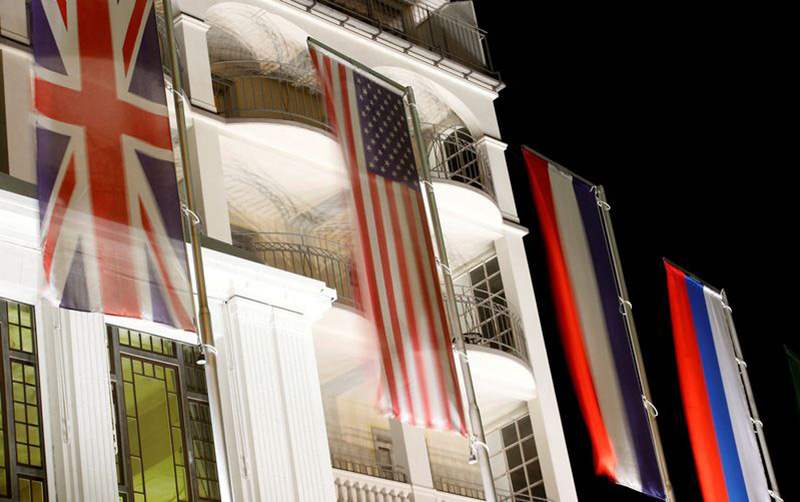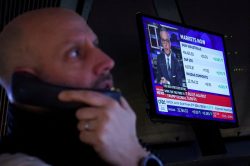
National flags of United Kingdom, United States of America, France and Russia hang in front of the Steigenberger Belvedere hotel in the Swiss mountain resort of Davos, Switzerland, in January 2018.
12:59 JST, January 4, 2022
MOSCOW/WASHINGTON (Reuters) — China, Russia, Britain, the United States and France have agreed that a further spread of nuclear arms and a nuclear war should be avoided, according to a joint statement by the five nuclear powers published by the Kremlin on Monday.
It said that the five countries — which are the permanent members of the United Nations Security Council — consider it their primary responsibility to avoid war between the nuclear states and to reduce strategic risks, while aiming to work with all countries to create an atmosphere of security.
“We affirm that a nuclear war cannot be won and must never be fought,” the English-language version of the statement read.
“As nuclear use would have far-reaching consequences, we also affirm that nuclear weapons — for as long as they continue to exist — should serve defensive purposes, deter aggression, and prevent war.”
Chinese Vice Foreign Minister Ma Zhaoxu said the joint statement could help increase mutual trust and “replace competition among major powers with coordination and cooperation,” adding that China has a “no first use” policy on nuclear weapons, state news agency Xinhua reported.
France also released the statement, underscoring that the five powers reiterated their determination for nuclear arms control and disarmament. They would continue bilateral and multilateral approaches to nuclear arms control, it said.
The statement from the so-called P5 group comes as bilateral relations between the United States and Moscow have fallen to their lowest point since the end of the Cold War, while relations between Washington and China are also at a low over a range of disagreements.
The Pentagon in November sharply increased its estimate of China’s projected nuclear weapons arsenal over the coming years, saying Beijing could have 700 warheads by 2027 and possibly 1,000 by 2030.
Washington has repeatedly urged China to join it and Russia in a new arms control treaty.
Geopolitical tensions between Moscow and Western countries have increased over concerns about Russia’s military buildup near neighbouring Ukraine. Moscow says it can move its army around its own territory as it deems necessary.
Last Thursday U.S. President Joe Biden told his Russian counterpart, Vladimir Putin, that a possible move on Ukraine would draw sanctions and an increased U.S. presence in Europe.
U.S. and Russian officials will hold security talks on Jan. 10 to discuss concerns about their respective military activity and confront rising tensions over Ukraine, the two countries said.
A conference on a major nuclear treaty that was set to begin on Tuesday at the United Nations has been postponed until August due to the COVID-19 pandemic.
Top Articles in News Services
-

Survey Shows False Election Info Perceived as True
-

Prudential Life Expected to Face Inspection over Fraud
-

Hong Kong Ex-Publisher Jimmy Lai’s Sentence Raises International Outcry as China Defends It
-

Japan’s Nikkei Stock Average Touches 58,000 as Yen, Jgbs Rally on Election Fallout (UPDATE 1)
-

Trump Names Former Federal Reserve Governor Warsh as the Next Fed Chair, Replacing Powell
JN ACCESS RANKING
-

Japan PM Takaichi’s Cabinet Resigns en Masse
-

Japan Institute to Use Domestic Commercial Optical Lattice Clock to Set Japan Standard Time
-

Israeli Ambassador to Japan Speaks about Japan’s Role in the Reconstruction of Gaza
-

Man Infected with Measles Reportedly Dined at Restaurant in Tokyo Station
-

Videos Plagiarized, Reposted with False Subtitles Claiming ‘Ryukyu Belongs to China’; Anti-China False Information Also Posted in Japan
























